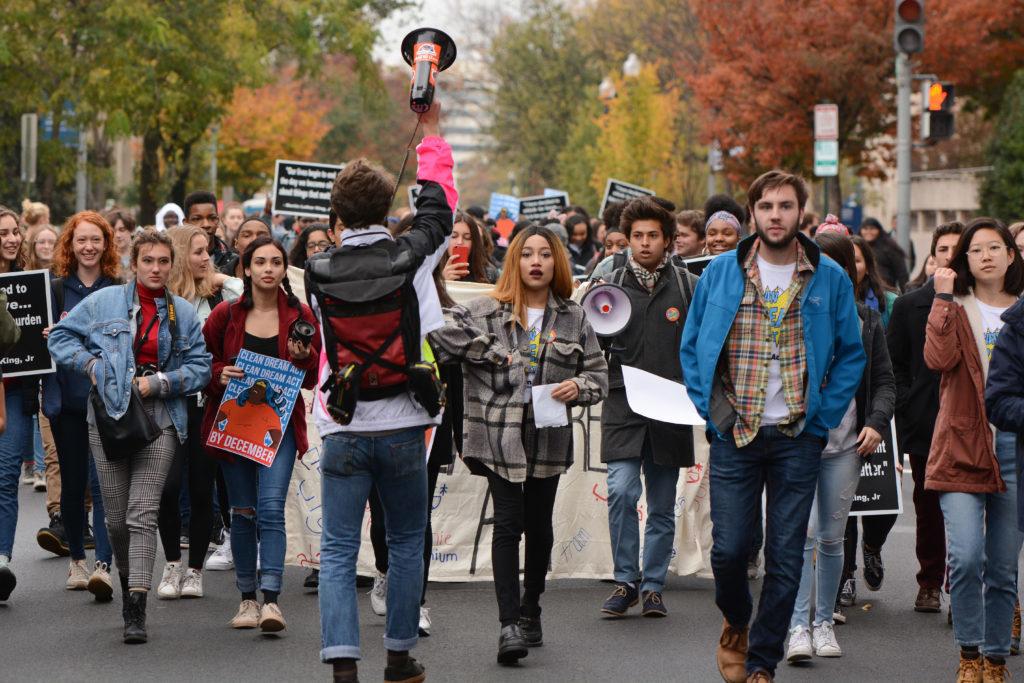GW is one of 19 universities across the United States backing the continuation of the Deferred Action for Childhood Arrivals program.
Nineteen universities, including peer schools Georgetown and New York universities, filed an amicus brief to the Supreme Court on Oct. 3 claiming that students who come to the United States under the DACA program benefit their institutions. Officials said GW’s participation in the brief expands on the University’s previous commitments to support the program.
“Like their classmates, these young people were valedictorians, student government leaders, varsity athletes, inventors, academic award winners, accomplished artists and role models for younger children in their communities,” the brief states.
Former President Barack Obama enacted DACA in 2012 to provide work permits and relief from deportation for immigrants who were brought to the United States while they were under the age of 16. President Donald Trump rescinded DACA in 2017, claiming that the program oversteps the Constitution.
The federal government stopped accepting DACA applications in September 2017. More than 16,200 immigrants have lost their work permits since 2017, according to FWD, an organization that advocates for immigrants’ rights.
“While DACA does not provide our students and alumni a path to citizenship, it does offer them a measure of security and access to opportunities for educational and professional development,” the brief states.
The brief states that individuals under the DACA program come to the United States hopeful for their futures and determined to work hard to build lives for themselves. DACA allows “dreamer” students to study in universities and legally work in the United States, according to the brief.
“Through the opportunities provided by American institutions of higher education all over this country, including amici’s, these young people now have the skills to give back – in ways big and small – to the country that raised them,” the brief states.
University spokeswoman Crystal Nosal said GW’s participation in the brief is a “continuation” of the amicus brief GW signed onto with the same universities in 2017 to support litigation against the Department of Homeland Security that would have rescinded the DACA program.
“GW values the contribution that all of our students bring to our campus community,” Nosal said in an email. “As soon as the Supreme Court announced in June 2019 that it would hear the DACA case, GW anticipated signing onto an amicus brief.”
Nosal declined to say how officials worked with other universities to draft the brief and how the re-implementation of DACA would impact students and the University.
DACA has allowed about 800,000 undocumented individuals to stay in the United States to work, according to FactCheck, a website run by the Annenberg Public Policy Center at the University of Pennsylvania.
Students urged officials in 2016 to establish GW as a “sanctuary campus,” which would implement policies that would make the campus safe for immigrants, students of color and undocumented students. Students who came to the United States under DACA voiced concerns about deportation when Trump announced plans to roll back the program in 2017.
Spokespeople from 15 of the other universities involved with the brief did not return multiple requests for comment. Spokespeople for Columbia and Harvard universities and Washington University in St. Louis declined to comment.
Arelis Palacios, the associate director for undocumented student services at Georgetown University, said Georgetown President John J. DeGioia has provided legal services and advising for students who came to the United States under DACA.
“Whether it be free legal services through our partnership with Catholic Charities Immigration Legal Services or on-campus advising, we remain fully dedicated to supporting our undocumented students and the unique challenges they face,” Palacios said in an email.
Drew Amstutz, the vice president of communications for GW College Democrats, said he is proud the University has taken a stand to call for the federal government to re-instate the DACA program.
“By having the DACA program, it allows us to reach out into communities that might not feel that they have access to education,” he said. “Whenever we extend education to more students, the student body as a whole benefits.”
Amstutz said that GW’s prominent support for DACA in 2017 was a “breath of fresh air” for him when applying to colleges.
“You have all of the best schools in the country, and you have GW in that list,” Amstutz said. “It really says something that these institutions, which people come running to whenever they need answers to a problem, these institutions are demanding a change, and I’m glad that GW is in the forefront of this.”
John Olds, the chair of GW College Republicans, said the organization supports the University’s efforts to re-instate the DACA program.
“DACA has allowed some of the best and brightest among us to go to school without living in fear,” Olds said in an email. “We applaud the University’s decision to help students further their education regardless of their immigration status. We hope that Congress can come to a permanent legislative solution in the near future.”
Lia DeGroot contributed reporting.





